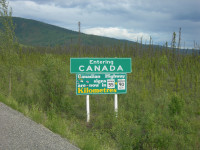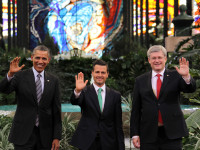Bell’s promotion of a site blocking system in Canada – rejected by the CRTC on jurisdictional grounds – was grounded in the view that it could establish a mandated blocking approach without court orders. That placed the Canadian proposal off-side the vast majority of site blocking systems around the world, but it also pointed to mounting efforts to exclude the courts from the realm of copyright enforcement. For example, the Canadian Anti-Counterfeiting Network recently appeared before the Industry committee to argue for legislative reforms that would eliminate court oversight for seizures at the border. In its place, the group argued that customs authorities should be empowered to seize and destroy goods without court review.
Post Tagged with: "counterfeiting"
Just Passing Through: Why Canadian Anti-Counterfeiting Law Should Not Permit In-Transit Shipment Searches
As Canadian officials prepare for the forthcoming NAFTA renegotiation, changes to Canada’s border measures provisions seem likely to surface as a U.S. demand. Late last month, the USTR released its annual Special 301 report and the issue of Canadian anti-counterfeiting law – in particular, the absence of provisions to allow for the search of in-transit shipments that are not bound for Canada – topped the list of concerns. The U.S. report states:
The United States remains deeply concerned that Canada does not provide customs officials with the ability to detain, seize, and destroy pirated and counterfeit goods that are moving in transit or are transshipped through Canada. As a result, the United States strongly urges Canada to provide its customs officials with full ex officio authority to address the serious problem of pirated and counterfeit goods entering our highly integrated supply chains.
The U.S. position has garnered some support in Canada. For example, a recent Globe and Mail editorial urged the government to change the 2014 anti-counterfeiting law by granting customs agents the power to search and seize shipments that are not bound for Canada.
The Trouble With the TPP, Day 24: Missing Balance on IP Border Measures
The day after Canada signed the TPP (and a Leger poll found huge opposition to the agreement’s IP and ISDS provisions), the shift toward consultation and study can continue in earnest. Chrystia Freeland, Canada’s Minister of International Trade, used the signing to emphasize once again that signing is not the same as ratifying and that the government is committed to a robust Parliamentary and public review of the agreement.
The Trouble with the TPP series continues today with another example of the lack of balance in the text. An earlier post noted how in the TPP rights holders’ provision are often mandatory, while those for users are treated as optional. The lopsided approach is also evident in the border measures rules. This week I discussed the expansion of border measures provisions without court oversight, which could lead to customs officials being asked to make difficult legal assessments on whether to detain goods entering the country.
The Trouble with the TPP, Day 21: U.S. Requires Canadian Anti-Counterfeiting Report Card
This weekend, former Research in Motion co-CEO Jim Balsillie wrote a must-read opinion piece in the Globe and Mail on the TPP. Balsillie makes a compelling case for how Canadian IP policy has failed in light of decisions to consistently cave to foreign pressures:
Starting in the 1980s, Canadian policy makers and politicians blindly bought the narrative lobbied by foreign corporations, first in the pharmaceutical industry and then across all sectors, that stronger IP protection would lead to more domestic innovation and prosperity.
Three decades later, our pharma R&D has declined dramatically and drug prices for Canadian consumers are among the highest in the world. Our largest technology companies are much smaller now than 10 years ago and we have zero growth in innovation outputs over the past 30 years.
We should have learned our lesson by now, and yet the same outdated thinking from the 1980s is back on display from today’s TPP proponents: Focus on aligning our domestic IP laws with the U.S. system and hope for the best. TPP needs to be assessed not for its legal purity or alignment to U.S. laws, but for the economic impacts colonial IP policies have on Canada. After all, Canada has aligned its laws with the United States both directly and indirectly in several international treaties over the past three decades, and our innovation performance always faltered thereafter.
The Trouble with the TPP series has already reviewed how the TPP offers more of the same through policies such as copyright term extension and locking in extended patent protections. The agreement also addresses IP enforcement and border measures, just months after Canada changed its rules to provide more protections and enforcement.
The Trouble with the TPP, Day 6: The Price of Entry
An examination of the Trouble with the TPP copyright provisions would not be complete without discussing how Canada reformed its law before entering the negotiations as part of the price of admission to the TPP talks (prior posts include Day 1: US Blocks Balancing Provisions, Day 2: Locking in Digital Locks, Day 3: Copyright Term Extension, Day 4: Copyright Notice and Takedown Rules, Day 5: Rights Holders “Shall” vs. Users “May”). The pre-TPP reforms must surely be considered part of the cost of the agreement even if proponents now argue that the TPP is consistent with (the reformed) Canadian law.
Canada was not an initial participant in the TPP negotiations. The Harper government began working on entry into the TPP in 2009, leading to a formal request for participation in the negotiations in 2011. The U.S. held a consultation on Canada’s proposed entry into the TPP a year later, resulting in the IIPA, the lead lobby group for the movie, music, and software industry, urging the U.S. government to keep Canada out of the negotiations until a copyright bill was passed that satisfied U.S. expectations. The Canadian government responded by promising to pass the law and noting that it had also signed the Anti-Counterfeiting Trade Agreement (ACTA). The U.S. demands had an enormous impact on the contents of the Canadian copyright bill, particularly the retention of restrictive digital lock rules that were at the very top of the U.S. priority list.











